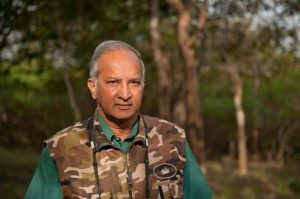
GAINESVILLE, Fla. — A wildlife ecology legend, K. Ullas Karanth, received the Distinguished Alumnus Award from the University of Florida at the December commencement ceremony.
This award is one of the highest honors bestowed upon a graduate of the university, recognizing individuals who have excelled in their field or performed outstanding service to the university.
Karanth earned his bachelor’s degree in mechanical engineering in 1971 from India’s Karnataka Regional Engineering College at Mysore University. He then became a University of Florida College of Agricultural and Life Sciences graduate when he earned a master’s degree in wildlife ecology and conservation in 1988. Karanth continued his studies to earn his doctorate in 1993 from Mangalore University in India. Through his master’s research and doctoral program, Karanth developed expertise in a field he was passionate about: wildlife biology and ecology.
“As part of a land-grant institution, we encourage our students to make an impact on their world and to serve the public good, and we strive to give them the tools needed to do so,” said CALS Dean Elaine Turner. “Dr. Karanth’s scientific contributions since graduating from the university are an excellent example of the widespread impact alumni can make, and we are proud to call him an alumnus of our college.”
The science of saving tigers
Karanth has been researching the ecology of tigers and other large mammals for the past 32 years. In the early 1990s, he pioneered the use of photographic mark-recapture methods to estimate and analyze wildlife populations. Because many wildlife species are hard to track and monitor, Karanth’s breakthrough research provided a way for others to use remote cameras to photograph and track the animals in a non-invasive way.
“[Karanth] is generally considered the best tiger biologist in the world,” said George Schaller, senior conservationist for the Wildlife Conservation Society. “He has changed how tigers and other large carnivores are counted and monitored by developing accurate techniques for analyzing and modeling camera-trap, insect samples and other such carnivore data.”
In his research in India, Karanth coupled the photographic methods with distance and occupancy sampling techniques to monitor tiger and hoofed populations for over two decades. Most known information related to the ecology and population dynamics of tigers comes from Karanth’s research efforts.
To disseminate his scientific discovery, Karanth has published more than 150 scientific papers in prestigious journals and written nine books. His work has also been featured in global media including Nature, Science, New Scientist, New York Times, Time Magazine, National Geographic, BBC, CNN, PBS, CBC, Discovery and Animal Planet.
“Ullas’ creativity in the complex tasks of applying evidence-based science to the difficulties of conservation application have established a world standard and his development of conservation science and its applications not only in India, but in many additional regions, have made him a world authority,” said William Conway, former president and general director of the Wildlife Conservation Society.
Conversation contributions
For more than 50 years, Karanth has been active in conservation efforts, working diligently to ensure his science positively influences government policies and public outreach. His contributions to conservation stretch globally as he has helped develop protocols for monitoring tiger and hoofed populations in Thailand, Lao and Cambodia and has contributed to these efforts in Russia and China.
Karanth has used the results of his research to create three protected areas in the highly biodiverse Western Ghats mountains of India. He has also been influential in implementing programs that holistically address the human-wildlife interface in India and around the world.
His contributions to conservation practices have led to several awards including the J. Paul Getty International Award from World Wildlife Fund-USA, the Seattle Zoological Society’s Thrive Award, and multiple national awards in India. He also has been a finalist for the Indianapolis Prize, which is considered the top international conservation award.
Inspiring the future of science
In addition to Karanth’s research and conservation efforts, he has also recruited, mentored and inspired future generations of wildlife scientists. Karanth is an adjunct professor at the University of Florida, University of Minnesota and the Tata Institute of Fundamental Research-NCBS at Bengaluru.
“His guidance and input to the students’ research design and analysis greatly enhanced the quality of their work and eventual contribution to the knowledge base and conservation of natural resources,” said Mel Sunquist, UF wildlife ecology and conservation professor emeritus.
Karanth has also been instrumental in developing wildlife programs and courses for students in India. He provides students holistic training through a biology-based curriculum combined with media relations and project management. The alumni of his wildlife biology and conservation course at the National Centre for Biological Sciences in Bengaluru have contributed to the literature on Indian wildlife, with nearly 300 scientific publications, which form the largest body of literature by a group in India in the last decade.
“His presentations and international activities have clearly raised UF’s profile as a major research university, significantly enhanced the academic programs of graduate students, and provided the education and training for the next generation of global conservation leaders,” said Sunquist. “I can’t think of a better recipient for a Distinguished Alumnus Award.”
-30-
The College of Agricultural and Life Sciences (CALS) administers the degree programs of the University of Florida’s Institute of Food and Agricultural Sciences (UF/IFAS). The mission of the College of Agricultural and Life Sciences is to deliver unsurpassed educational programs that prepare students to address the world’s critical challenges related to agriculture, food systems, human wellbeing, natural resources and sustainable communities. The college has received more total (national and regional combined) USDA teaching awards than any other institution.
 0
0

Comments are closed.